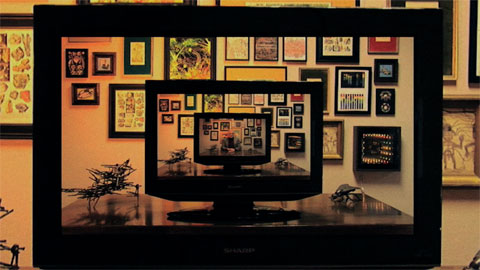
INTENTIONAL MISDIRECTION? The Institute raises many questions. |
Ostensibly, the first feature film by Spencer McCall seeks to provide a portrait of a San Francisco organization called the Jejune Institute, whose mission hovers somewhere between the poles of self-help, performance art, disinformation, and an alternate-reality game. But if this is a portrait, we're not in art class anymore. Over a series of interviews with organizers and "inductees" spliced with raw-seeming candid footage of Jejune activities in full swing, we join together the bare bones of a most mysterious organizational body.
There's a hazily cultish, pseudoscientific induction ceremony; a bizarre sort of scavenger hunt through the city's financial district; and even a renegade inductee called Organeil whose fervent dedication to the reshaping of reality so far surpassed the group's that it led to a sort of shadowy splinter faction. All is punctuated by a litany of stilted dispatches from an aged 1960s hippie-in-a-suit named Octavio Coleman, Esq., Jejune's purported intellectual founder and fervent proselytizer of its practice of "Nonchalance," about whom portrayals vary widely: virtuous godhead, scientific mastermind, and nefarious crackpot.
The role of pseudoscience looms large throughout. Indeed, by their own accounts several members first discovered the Jejune Institute through flyers for strangely metaphysical quack products (like the Vital Organ Force Field, for example). Interest in such things, the film would suggest, is a trait shared by certain adventurous or otherwise disaffected souls; these are the majority of Jejune participants, who recall with a bubbling mix of bewilderment and wonder their roles in subterranean rescue missions, objectless protests, and spontaneous dance jams at public pay phones (the latter of which involves a sasquatch, just so you know).
As a roundabout sort of documentation of a fundamentally ephemeral practice, it's only natural that The Institute falls short of fully capturing its subject. Even after the second viewing, the impulse to consult the Internet for clues was strong. But such inquiries go nowhere. The Institute is a closed loop.
As so much else will prove to be, the film reveals the Jejune Institute product line i as something of a red herring. The only thing they're selling, it seems, is obsequious devotion to the philosophies of one Evalyn Lucien, a free-spirited young woman we learn went missing in 1988. If Coleman is the intellectual forebear of Nonchalance, then Eva (the film insists on the nickname without the forensic attachment of a surname) is its matriarch, writing longingly about a place she calls "elsewhere." As if bounding down a rabbit hole or one of its own tortuous scavenger hunts, the sudden focus on her dossier is startling. She is exalted: Eva the artist, Eva the discontent, Eva the icon. The sensation of huh? is prolonged.
But holding it to the standards of a documentary seems a little unfair. McCall's film might equally be seen as a sort of instruction manual. He's clearly fascinated — maybe even involved to a degree — with his subject, and seems to understand that treating it either with rigorous exegesis or the blustery devotion of an acolyte would greatly diminish its appeal. He also doesn't bother to contextualize, and so like Eva and Coleman, the specters of Wilhelm Reich, L. Ron Hubbard, Allan Kaprow, Judith Malina, Ivan Stang, and even The Matrix haunt the film from afar. Putting aside its fictions, it smartly examines the possibilities of non-monetized life, and so is basically a must for performance-art students, latent Situationists, punks, hippies, radicals, cultural studies academics, the unconscionably bored, and any theater person who goes beyond Sam Shepard.